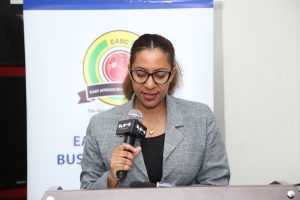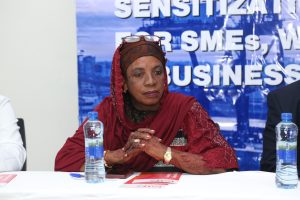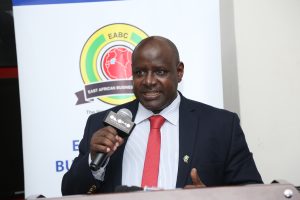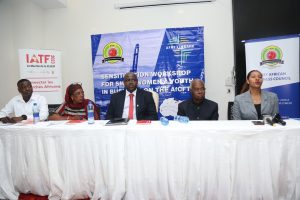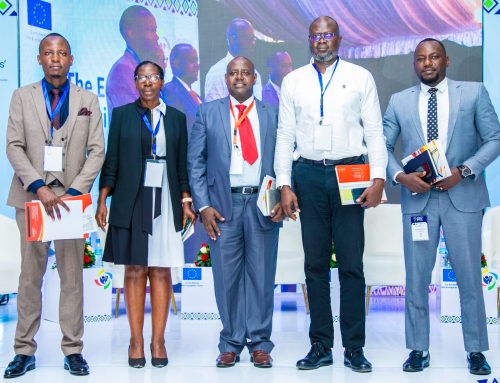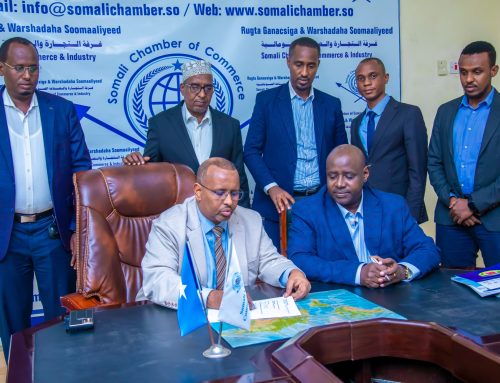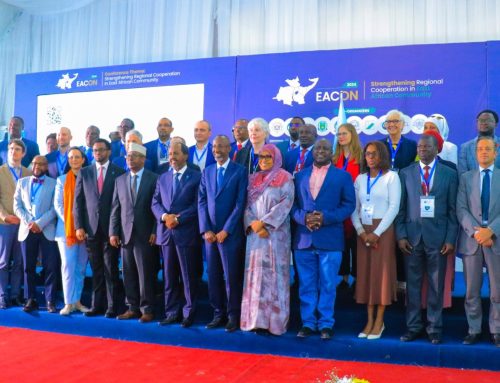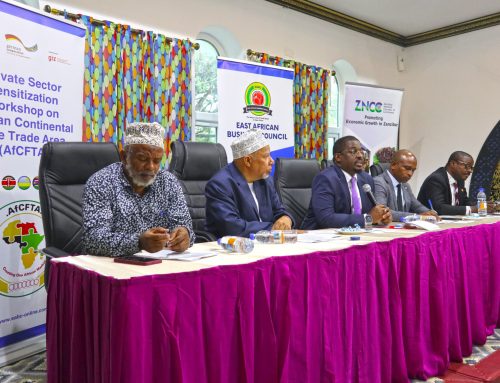On 19th October 2023 – the East African Business Council (EABC) in partnership with the African Export-Import Bank (Afreximbank) marked the commencement of a pivotal event, the “Sensitization Workshop for SMEs and Women in Business on the AfCFTA Protocols and Their Relevance to Business in the EAC Region,” with a particular focus on the United Republic of Tanzania’s SMEs and Entrepreneurs. The workshop took place at the prestigious Onomo Hotel in Dar es Salaam, Tanzania, and witnessed a gathering of esteemed speakers and participants eager to explore the immense potential of the African Continental Free Trade Area (AfCFTA).
In his enlightening address, Mr. John Bosco Kalisa, CEO of the East African Business Council (EABC), provided a comprehensive overview of AfCFTA. He highlighted key statistics that underscored the significance of this trade agreement. Notably, AfCFTA officially commenced in 2021, encompassing 55 countries and an impressive population of 1.3 billion people. Projections indicate that this population is expected to grow to 1.7 billion by 2030, with approximately 600 million individuals entering the middle class. AfCFTA is anticipated to contribute to a combined GDP of $3.4 trillion and consumer spending of nearly $4 trillion. It is further projected that the efficient implementation of AfCFTA will lead to uplifting 20 million people from extreme poverty and 60 million from moderate poverty by 2035.
Acknowledging Africa’s current contribution of just 2% to global trade, Mr. Kalisa emphasized that AfCFTA aims to make a substantial impact on intra-continental trade. However, he noted that the full implementation of the agreement would require time as member states work towards finalizing various aspects, including dispute settlement, tariff offers, rules of origin, services, and intellectual property rights.
Crucially, the speaker emphasized the need to address not only tariffs but also non-tariff barriers (NTBs) between partner countries. AfCFTA provisions have been put in place for the reduction or elimination of NTBs, trade facilitation, and customs cooperation, encompassing regulatory measures such as sanitary standards and technical trade barriers.
The scope of this transformative agreement extends to the facilitation of services movement, including businesspersons. Member states are expected to finalize specific commitments for trade in services, with a focus on five priority sectors: business, communications, finance, tourism, and transport.
Mr. Kalisa highlighted the critical role that micro, small, and medium-sized enterprises (MSMEs) play in Tanzania and the wider EAC region. He emphasized the need for training on AfCFTA protocols to empower SMEs to access new markets, procure raw materials affordably, and enhance product quality and services through innovation.
For successful implementation, Mr. Kalisa underlined that private sector apex bodies, such as Business Councils and Private Sector Federations, must focus on building their members’ capacity to engage in trade across the continent. This is particularly relevant given that AfCFTA has been in effect since January 2023.
The CEO expressed gratitude for the training initiative led by the EABC, with a specific focus on empowering Tanzanian SMEs and women traders. He anticipates that participants will gain the knowledge necessary to leverage AfCFTA opportunities, drawing insights from those already engaged in cross-border trade.
Sara Mtelele, representing the CEO of the Tanzania Private Sector Foundation (TPSF), extended a warm welcome to the participants. She expressed gratitude to the East African Business Council for recognizing the significance of involving youth and women in business in this event.
Mtelele acknowledged the challenges faced by the region, which include the impact of COVID-19, disruptions in food and fuel prices linked to the Ukraine conflict, and ongoing conflicts. She emphasized the potential opportunities and challenges presented by AfCFTA for the region, emphasizing the importance of infrastructure development, industrialization, and addressing non-tariff barriers.
Furthermore, she highlighted the critical importance of eliminating non-tariff barriers and encouraged the private sector to advocate for the implementation of trade agreements. She stressed the need for transitioning to a digital economy, urging investments in digital infrastructure and skills.
Mtelele concluded her remarks by expressing hope that the knowledge and discussions at the workshop would enable participants to seize the opportunities presented by AfCFTA. She eagerly anticipated receiving their recommendations at the conclusion of the training.
Dr. Samuel Nyantahe, EABC Goodwill Ambassador, highlighted several key points in his remarks. He noted the significance of SMEs in the EABC’s policy advocacy agenda, emphasizing the inclusion of youth and women’s issues. Dr. Nyantahe mentioned the establishment of a dedicated desk for SME-related matters, which has proven instrumental in representing SME concerns both regionally and nationally through National Focal Points.
Additionally, he discussed the EABC’s technological initiatives, including a digital platform and phone application designed to promote SMEs and enhance their participation in intra-regional trade. These tools aim to accelerate the implementation of AfCFTA and provide real-time access to market information and trends.
Dr. Nyantahe emphasized the EABC’s partnerships with youth and women organizations to create an enabling policy environment for youth-led enterprises and build their capacity for cross-border trade.
In the broader context, he stressed the importance of good governance in trade to ensure that AfCFTA leads to developmental outcomes and reduces social inequality. Dr. Nyantahe called for active youth participation in trade governance at regional and national levels, similar to the African Union’s continental platform.
He closed by highlighting the ever-evolving nature of the trading environment and the need for today’s trade policymakers to create opportunities for youth participation in trade policy-making and eliminate trade barriers to foster inclusive and sustainable development. Dr. Nyantahe expressed appreciation for the invitation to the EABC and anticipated the implementation of workshop recommendations.
In her remarks, Amina Madeleka, acting as the Chairperson of the Tanzania Women Chamber of Commerce (TWCC) in Tabora Region, spoke on behalf of the chair of the Board in TWCC. She highlighted how women in Tanzania are going to work under the framework of the African Continental Free Trade Agreement (AfCFTA) and the benefits they can derive from this event. Amina also addressed the challenges that women may face while operating under AfCFTA.
Furthermore, the representative from the Tanzania Startup Association (TSA), Elia N. Mwoleka, emphasized the importance of AfCFTA and how it can be utilized effectively. This underlined the significance of leveraging AfCFTA’s potential for startups and young entrepreneurs in Tanzania.
The “Sensitization Workshop for SMEs and Women in Business on the AfCFTA Protocols and Their Relevance to Business in the EAC Region” commenced with insightful remarks from key figures in trade, business, and economic development. This event sets the stage for Tanzanian SMEs and women entrepreneurs to harness the vast opportunities presented by AfCFTA while navigating potential challenges effectively.


